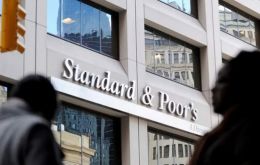MercoPress. South Atlantic News Agency
Tag: Standard & Poor's
-
Thursday, July 3rd 2025 - 10:19 UTC
S&P doowngrades Bolivia's ratings

Standard & Poor's (S&P) downgraded Bolivia's long-term credit rating from 'CCC+' to 'CCC-' with a negative outlook. This decision was driven by increasing debt servicing costs and a deteriorating external financial profile, which could make it harder for the landlocked country to access financing and potentially hinder its ability to pay off debt in the coming months.
-
Thursday, January 9th 2025 - 09:44 UTC
Leading risk rating agency further ups Paraguay's gradings

Paraguay's review by the international rating agency Standard & Poor's (S&P) has been upgraded from “stable to positive,” it was announced Wednesday in Asunción, as President Santiago Peña welcomed this new recognition.
-
Tuesday, March 26th 2024 - 12:06 UTC
Falkland Islands' A+ rating retained, signals economic strength

The Falkland Islands Government (FIG) has announced the retention of its global A+ sovereign rating by S&P Global Ratings, with a stable outlook. This rating reflects the government's strong financial capacity and prudent fiscal policies.
-
Thursday, March 14th 2024 - 19:29 UTC
S&P downgrades Argentina's rating in local currency

Despite Argentine President Javier Milei's stringent measures to curb inflation, his country took another slump Wednesday after the international credit rating agency Standard & Poor's (S&P) declared it in “Selective Default” following a domestic debt swap worth some U$S 55.3 billion in pesos with local creditors.
-
Thursday, April 27th 2023 - 10:27 UTC
How well did Uruguay do with S&P's latest ratings?

The credit rating agency Standard & Poor's Wednesday upgraded Uruguay BBB+, with a stable outlook, the highest level in the country's history, it was announced. This index reflects the level of risk involved in lending money to governments according to their economic conditions.
-
Friday, March 25th 2022 - 09:45 UTC
Falkland Islands Government retains their global S&P A+ rating

The Falkland Islands Government confirmed on Thursday that, following a detailed review of updated fiscal and economic information, supported by a process of confidential interviews with FIG officers and representatives of the business community, S&P Global Ratings have confirmed the sovereign rating for the Falkland Islands remains at A+ with a stable outlook.
-
Friday, December 4th 2020 - 08:56 UTC
S&P Dow Jones will launch cryptocurrencies indices in 2021

S&P Dow Jones Indices, a division of financial data provider S&P Global Inc, said on Thursday that it will launch cryptocurrency indices in 2021, making it the latest major finance company to enter the nascent asset class.
-
Saturday, March 28th 2020 - 08:34 UTC
S&P downgrades Mexico and oil giant Pemex credit ratings

S&P downgraded Mexico’s credit rating on Thursday as the coronavirus pandemic and a hit to state oil firm Pemex from plunging crude prices battered the growth outlook and piled pressure on the government to lift the struggling economy.
-
Wednesday, January 8th 2020 - 09:49 UTC
S&P admits a mistake and raised its debt grade for Argentina to CCC

S&P Global Ratings raised its debt grade for Argentina on Tuesday, acknowledging the agency made a mistake when it changed the rating in late December for the crisis hit country.
-
Friday, December 6th 2019 - 08:52 UTC
Brazilian government optimistic about reforms and the economy's performance forecast

The Brazilian government’s commitment to getting public finances in order and maintaining strict fiscal discipline will lead to the country’s sovereign credit rating being upgraded, Treasury Secretary Mansueto Almeida said on Thursday.
